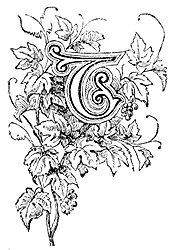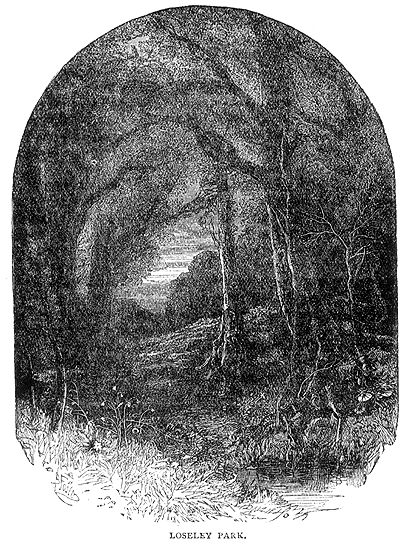 |
 HIS very ancient mansion is situated about two miles south-east of Guildford. It was much neglected for some years, but it retains a most beautiful chimney - piece in the dining-room, exquisitely carved, and a beautiful ceiling in the drawing-room of Gothic tracery and pendant corbels. In one of the cornices is a mulberry tree with these inscriptions on each side of it: Morus tarde Moriens, on the other, Morum cito Moriturum - a rebus on the family name. In one of the bedrooms is also a beautiful ceiling, in some of the compartments of which a moor cock and moor hen are introduced - the badges of the Mores. HIS very ancient mansion is situated about two miles south-east of Guildford. It was much neglected for some years, but it retains a most beautiful chimney - piece in the dining-room, exquisitely carved, and a beautiful ceiling in the drawing-room of Gothic tracery and pendant corbels. In one of the cornices is a mulberry tree with these inscriptions on each side of it: Morus tarde Moriens, on the other, Morum cito Moriturum - a rebus on the family name. In one of the bedrooms is also a beautiful ceiling, in some of the compartments of which a moor cock and moor hen are introduced - the badges of the Mores.
Loseley had the same name before the Conquest. It was given by Osmund to Edward the Confessor, and after William the Norman had gained possession of it as Crown property, he gave it to Robert de Montgomery, one of his bravest followers at Hastings. From him it passed into several hands, till it was purchased by Christopher More, the son of a Derbyshire gentleman in the reign of Henry VIII.
His son William was knighted by Leicester in the presence of Queen Elizabeth, and built the present house to the north of an earlier one, completing it in 68.
To Sir William succeeded Sir George More, who was knighted by Queen Elizabeth, and who, under James I., was Lieutenant of the Tower and Treasurer to Henry, Prince of Wales. In 1689, the male line failing, the estate devolved on the last heir's sister Margaret, who married, and took it to, Sir Thomas Molyneux, knight, in whose family it has continued.
In the time of Sir George More - 1600 to 1632 - a pretty love story became connected with Loseley.
A daughter of Sir George met at her aunt's house, with whom she lived, the celebrated scholar, poet and divine, John Donne. He was secretary to her aunt's husband, the Lord Chancellor Ellesmere, with whom he had lived five years when he fell in love with Anne More, and she with him. Sir George received a hint of this love and removed the young lady in haste to Loseley House, Surrey. But too late!
 The lovers must have met in Loseley Park, whenever an interview would be safe, and at last, despairing of ever winning Sir George More's consent to their union, they took an opportunity, and were privately married by the Rev. Samuel Brooke, the master of Trinity College, - Christopher Brooke, his brother, giving the bride away. How anxious and yet how happy must Anne Donne have been in her lovely home of Loseley, till at length Henry, Earl of Northumberland, Donne's great friend, revealed the secret to her father. Sir George flew into a fury of rage at the news, and at once used all his influence to get Mr. Donne, the clergyman who had married him and Mr. Christopher Brooke committed to prison, and Mr. Donne dismissed by the Lord Chancellor. Lord Ellesmere was very reluctantly persuaded at last to yield to his brother-in-law's entreaties, and Donne was dismissed from his employment and soon after imprisoned. But when he dismissed him lord Ellesmere said: "I have parted with a friend, and such a secretary as was fitter to serve a king than a subject." Donne wrote a sad letter to tell his wife of his dismissal and signed it, "John Donne, Anne Donne, undone." He was not long kept in prison, and once released never rested till he had procured the freedom of his two friends. His wife, however, was shut up by her father at Loseley, and he had to enter on a long and expensive law - suit to gain her. His original fortune was only £3,000, and he had spent some of this in travelling about Europe. When, therefore, he gained his bride, they were both extremely poor. Donne felt this, not for himself, but for his wife, who had been accustomed to live in great luxury; but she bore it bravely, happy in his love. At length their noble kinsman, Sir Francis Wolly, of Priford, Surrey, entreated them to share his house, and they accepted his offer. For some years they dwelt under his roof, and as their children increased - they had one yearly - his generosity and love seemed to increase with them. They remained with this true friend for some years, until his death; before which he had succeeded in reconciling Sir George More to his daughter and her husband. Sir George then gave his daughter £800 as her dowry, paying £20 quarterly for their maintenance, till the said portion was paid.
After Sir Francis Wolly's death Donne settled his wife and children at Mitcham, in Surrey, and took lodgings for himself in London, to which he went occasionally, and was visited by the nobility, who asked his advice in all difficulties. Still he and his family were very poor, and he writes pathetic letters of the whole family suffering with illness, and of his being so poor that he can scarcely pay a doctor, and "could not bury them if they died."
But help came again. Sir Robert Dewry, a rich and liberal man, offered him apartments in his own large house in Drury Lane, rent free, and here he moved his family. Whilst he was living here, Sir Robert resolved to go to France with Lord Hay, who was sent there on an embassy by James 1. to Henry IV., and he asked Donne to accompany him. The latter could scarcely refuse such a request from such a friend, though his wife was reluctant to let him go, and they departed together.
It was during this absence that Mr Donne had the singular vision which has been recorded by Izaak Walton.
"Two days after their arrival" (in Paris), says Walton, "Mr. Donne was left alone in the room in which Sir Robert and he and other friends had dined together. To this place Sir Robert returned within half an hour, and as he left so he found Mr. Donne alone; but in such an ecstasy, and so altered as to his looks, as amazed Sir Robert to behold him, insomuch that he earnestly desired Mr. Donne to declare what had befallen him in the short time of his absence. To which Mr. Donne was not able to make a present answer, but after a long and perplexed pause did at last say, 'I have seen a dreadful vision since I saw you; I have seen my dear wife pass twice by me through this room, with her hair hanging about her shoulders, and a dead child in her arms; this have I seen since I saw you.' To which Sir Robert replied, 'Sure, sir, you have slept since I saw you, and this is the result of some melancholy dream, which I desire you to forget, for you are now awake.' To which Mr. Donne's reply was, 'I cannot be surer that I now live, than that I have not slept since I saw you, and am as sure that at her second appearance she stopped and looked me in the face and vanished."'
The next morning Donne was still firm in his belief that he had seen a vision, and Sir Robert, very curious on the subject, sent a servant at once to Dewry House to inquire how Mrs. Donne was The twelfth day from his departure he returned, with an account that Mrs. Donne war. very ill and very sad, and that she had had a dead child; its birth had happened the same day and about the same hour that Mr. Donne had seen the vision. It was probably a dream, as Sir Robert said, but the sympathy between the wedded lovers must have been very strong to have produced it at the same hour as his wife's sorrow.
"Though it is most certain," says quaint Izaak Walton, "that two lutes being strung and tuned to an equal pitch, and then one played upon, the other that is not touched being laid upon a table at a fit distance, will, like an echo to a trumpet, warble a faint audible harmony in answer to the same tune, yet many will not believe that there is any such thing as a sympathy of souls, and I am well pleased that every reader do enjoy his own opinion."
Donne took orders in the Church, and James I. made him his Chaplain in Ordinary. He might now hope to become a prosperous man, but a heavy sorrow fell upon him in 1617, when his beloved wife died. He was still poor, and the father of seven living children (five were dead). and he then promised them that he would never give them a step-mother. He kept his word, remaining faithful till his death to the beloved woman who had given up the world for him.
James created him Dean of St. Paul's, and he received also the Vicarage of St. Dunstan. He became a man of whose alliance any family might have been proud, and Sir George More became one of his greatest admirers. But Donne's wife was no longer with him to partake of his prosperity, and he must often have looked back with a sad sigh to the days of his happy though secret love at Loseley House.
Donne's poems are too quaint to suit the taste of the present day, but it may not be uninteresting to our readers to see one of the poems that charmed the heart of Anne Donne.
|
 |